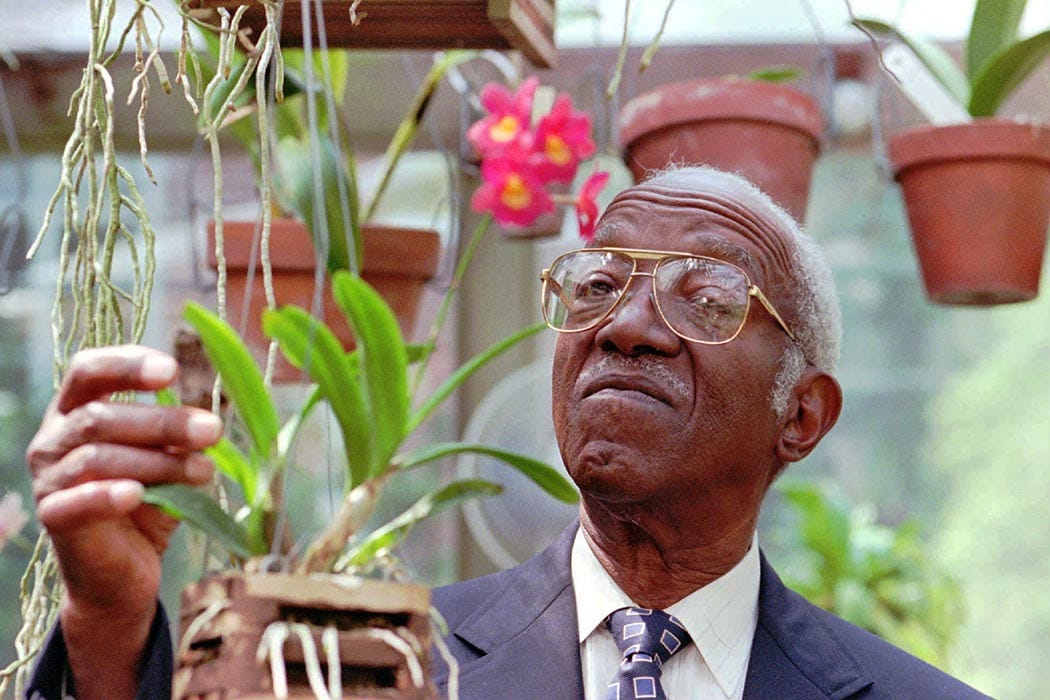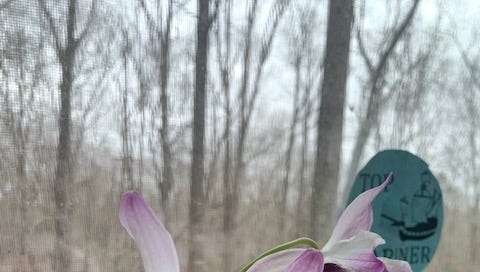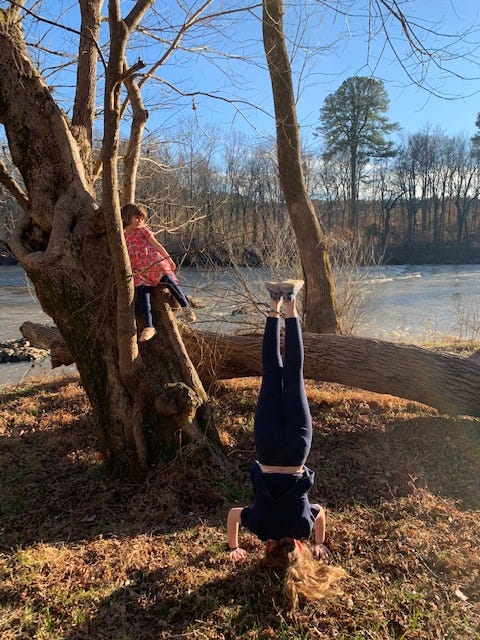This morning Bea took some photos of her newest orchid, a Nobile Dendrobium Love Memory “Fizz.” When we got it from the Orchid Gallery, it wasn’t in bloom or even in bud, but now it has four beautiful blossoms. Bea says she chose this plant because it’s native to Asia (from the foothills of the Himalayas, according to our orchid guide, Jeff Baldwin). But I was interested in something else that Jeff told us, and that we could see on the small tag—it came from John Hope Franklin’s collection.
“You mean the famous historian, John Hope Franklin?” I asked. “We can buy one of his plants?”
John Hope Franklin published the landmark book, From Slavery to Freedom: A History of African Americans, in 1947. Franklin lived much of his later life in Durham, North Carolina, where he was an endowed professor of history at Duke University and professor of legal history at Duke Law School. He was the first Black scholar to hold an endowed chair at Duke, and the school now has an interdisciplinary research center named for him. Before that he marched with Dr. King from Selma to Montgomery, wrote legal briefs for Thurgood Marshall in Brown vs. Board of Education, and taught at Howard University, the University of Chicago, Cambridge, and many other schools.
In addition to the many important contributions he made to history, social justice, and the humanities—writing more than 20 books, teaching at prestigious universities, and serving as president the of American Historical Association and the Southern Historical Association—Franklin and his wife Aurelia were active orchidists, Jeff told us. Today the Orchid Gallery has a large population of plants cultivated from their collection. (Jeff also has begonias and pothos propagated from plants owned by Ernest Hemingway and Albert Einstein!)

Over their 58-year marriage, Franklin and Aurelia collected more than 350 orchids, which they grew in greenhouses in Brooklyn, Chicago, and Durham. Two hybrids—phalaenopsis John Hope Franklin and phalaenopsis Aurelia Franklin—were named after them.
The fact that you can keep plants going, and share them with friends, through propagation is one of our favorite things about being plant parents. We’ve been thinking a lot about propagation lately because we’re planning an experiment with Bea’s third-grade class using propagated pothos from her collection.
It’s the perfect time to propagate because we’re through the Persephone period, with more than ten hours (and counting) of daylight each day. This is a signal to plants that it’s time to grow. In natural light conditions, you can plop a plant cutting into a clear jar of untreated water (ideally collected rainwater) and see roots emerging from nodes within the week. Just keep leaves out of the water, and change the water weekly, and you’ll soon be ready to share plants with a friend.
To propagate, though, has another meaning: “to foster growing knowledge of, familiarity with, or acceptance of (something, such as an idea or belief.” Throughout his career, John Hope Franklin helped spread knowledge, familiarity, and acceptance of the idea that Black history was American history. “My challenge,” Franklin said, “was to weave into the fabric of American history enough of the presence of blacks so that the story of the United States could be told adequately and fairly.”
In the same way that horticultural propagation requires care—changing the water, making sure the plant gets enough light and nutrients—to keep a plant’s life going, the propagation of knowledge and ideas is a responsibility that is shared, passed down, and important. From Slavery to Freedom has been through ten editions, has sold millions of copies, and is one of the texts suggested by the recently challenged AP African American studies curriculum.
I read that John Hope Franklin liked going into the greenhouse because each day, something was new. I like to imagine the tropical air of the greenhouse as a balm for him as he worked on that other kind of propagation—of knowledge and ideas—throughout his long and significant life.
In 1997, Franklin told the New York Times that orchids are “[n]ot tough to grow. They enjoy a reputation of being tough, the kind of reputation that some people enjoy: being tough when they really aren't.”
P.S. We enjoyed this article on how to get plants for free. Also, we’re spending the rest of this chilly day on homemade valentines, so look for an upcoming post with ideas!






I learned something today about John Hope Franklin that I did not know! (And. . . I really like your reference to "the Persephone period.")
I love FTT so much. This is my first time ever reading in full screen on my ipad I love that we are in the Persephone period I love learning something new and inspiring every time I read
Peace Love Luck and Frogs. mamie